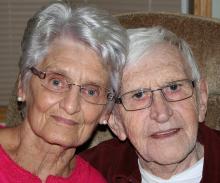At the request of Elsie Wiebe of Mennonite Women in Manitoba, Mennonite Collegiate Institute graduating student Amelia Pahl interviewed Martha Epp, 77, of Morden, Man., who has been the primary caregiver for her husband Henry, 88, ever since debilitating arthritis set in all over his already frail body four years ago. Both Epp and Pahl attend Morden Mennonite Church.
AP: In what ways do you care for Henry from day to day?
ME: First of all, I look after the pills. Not that he couldn’t do it, but it’s just safer when somebody knows more about the medication and what it can do to you. Another aspect would be encouragement. That’s maybe not a physical thing, but it’s still very important. And then just making sure that his cleanliness is kept up, like showers, manicures, haircuts. Also, helping him around when we go out; if he’s not using his walker, he has his cane, but needs assistance on his left side. Generally, I give all-around care, cooking meals and just being there for him. It’s ongoing caring.
AP: How has this intensity of care affected your relationship with one another?
ME: I think, if anything, it’s brought us closer. We’ve been married 57 years, and for 36 years we ran a bakery together, working together from morning till evening. We have never been separated for work. Even now, we can spend hours together, we don’t have to talk. We just have the comfort of knowing that [we’re there for each other].
AP: Do you wonder about what life would be like when you no longer have each other?
ME: I think about it a lot, actually. And when I’m down and out, I think about how, for him, it would be a release. When I’m caring for him, I also do all the financial planning and details, and when something needs fixing, it’s all on me. It feels so big sometimes. But then I think, if he wasn’t here, who would care? Would I care about getting things fixed or would I just let my life run down? I can tell from other people, when they lose a spouse or loved one, how lonely they become. I can’t imagine life being any different than being together. We’ve cried and we’ve laughed together. We’ve had a really, really good life.
AP: How do you care for yourself in the midst of this?
ME: That is a good question. Sometimes I don’t. I realized last year, just before Christmas, that I was becoming very tired and quite agitated at times. I had isolated myself, and I did not want to see or speak to people, and I realized something wasn’t right. Then one Sunday I crashed and just let it out, and the person I fell apart in front of was wonderful in listening and praying with me. That was when I realized I needed some help.
So I went to see a counsellor whom I’ve gone to for years. She pointed out that caregivers need to be cared for, not just those they care for. She suggested that I take a break, which I did. I went away for a week with my daughter and it was wonderful.
But it’s not just getting away, it’s also finding quiet time for myself [doing things like quilting, which help her relax]. I keep telling myself I’m never alone; God walks beside us every day. He is wherever we are, and it’s amazing how many times we can draw strength from him.
And both Henry and I feel so uplifted when we go to church Sunday mornings. I feel needed there, I feel like I’m getting filled. I feel the love of people who care. I give thanks to God for that.
AP: What has this experience of caring for Henry taught you about love?
ME: I’m thankful for God’s love first of all. If we hadn’t experienced his love, I think it would be harder for me to deal with love, or show love, even in our relationship. Like I Corinthians says, all of these three—love, faith, hope—are important, but the greatest of these is love. Love is just a wonderful thing. There are no words that can really describe it. It’s a wonderful feeling. . . . I don’t know how we’d live our life together otherwise.
Amelia Pahl splits her time between church choir, writing and musical theatre.





Add new comment
Canadian Mennonite invites comments and encourages constructive discussion about our content. Actual full names (first and last) are required. Comments are moderated and may be edited. They will not appear online until approved and will be posted during business hours. Some comments may be reproduced in print.